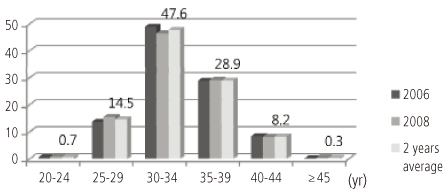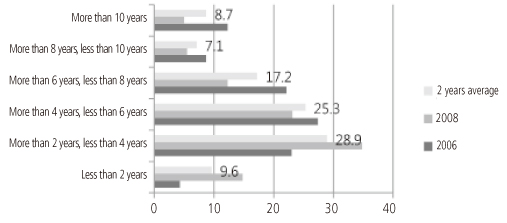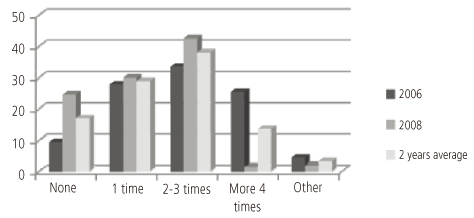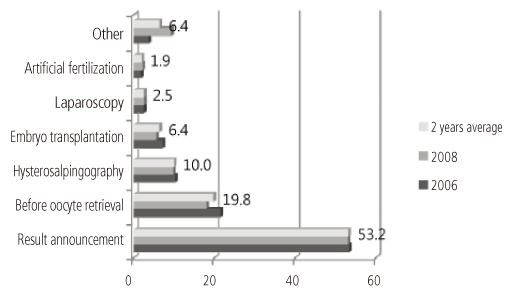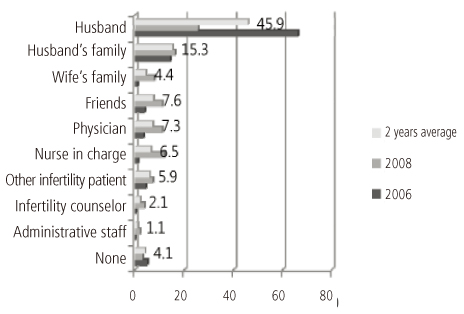Korean J Obstet Gynecol.
2011 Oct;54(10):611-617. 10.5468/KJOG.2011.54.10.611.
Current status of infertility counseling in Korea
- Affiliations
-
- 1Department of Obstetrics and Gynecology, Hanyang University College of Medicine, Seoul, Korea. hwangjh@hanyang.ac.kr
- 2Department of Preventive Medicine, Hanyang University College of Medicine, Seoul, Korea.
- 3Department of Obstetrics and Gynecology, Seoul National University College of Medicine, Seoul, Korea.
- KMID: 1836747
- DOI: http://doi.org/10.5468/KJOG.2011.54.10.611
Abstract
OBJECTIVE
The recent fertility decline deepened concern about the emotional side of infertility problems as well as social, ethical, legal and psychological aspect and increased awareness of the importance of consultation. In this study, we evaluated the current condition of infertility counseling for couples participated in the project supporting infertile couples by Ministry of Health and Welfare in Korea.
METHODS
Postal survey was administered to infertility couples who received medical cost support in 2006 and 2008. We investigated 11 different of infertility counseling through the postal survey.
RESULTS
The most common number was two or three sessions of counseling before infertility treatment (409 cases in 2006, 534 cases in 2008, respectively). The most common counselor to infertile couples was a physician, (1,009 cases in 2006, 879 cases in 2008, respectively). The most common form of counseling was verbal counseling in the office of the physician to the patient or couple alone and psychological testing was not performed in 1,133 cases among 1,182 cases in 2006 and 1,105 among 1,227 in 2008 respectively. One of the most stressful events during treatment was results announcement and the most helpful person was the spouse.
CONCLUSION
Many infertile couples who received the psychological counseling answered that it was helpful in stabilizing the emotional status of patients and professional psychological counseling of infertile couples with access as a teams will be needed. Further investigations are needed to study the effects that various infertility counseling methods can promote the infertility treatment process and outcomes.
MeSH Terms
Figure
Cited by 3 articles
-
A Survey on the Current Status and Demands of Infertility Counseling Towards the Development of an Infertility Counseling Delivery System
Young Sun Lee, Jung-Hye Kwon
J Korean Soc Matern Child Health. 2020;24(1):52-63. doi: 10.21896/jksmch.2020.24.1.52.The Focus Group Interview on Infertility Experts for the Development of Infertility Counseling System
Seung Mi Choi, Young Sun Lee
J Korean Soc Matern Child Health. 2020;24(1):26-39. doi: 10.21896/jksmch.2020.24.1.26.A Study on Counseling Experiences of Nurses of Infertility Centers Using a Qualitative Research Method
Jummi Park, Nayeon Shin
J Korean Soc Matern Child Health. 2020;24(4):221-233. doi: 10.21896/jksmch.2020.24.4.221.
Reference
-
1. Covington SN. The role of the mental health professional in reproductive medicine. Fertil Steril. 1995. 64:895–897.2. Silman R. Jennings S, editor. What is fertility counseling? Infertility counselling. 1995. Oxford: Blackwell Science;205–213.3. Hwang NM, Hwang JY, Kim JM. The evaluation of national supporting program for infertility and future policy directions. 2010. Seoul: Korea Institute for Health and Social Affairs;Report No. 2010-30-13.4. Boivin J, Scanlan LC, Walker SM. Why are infertile patients not using psychosocial counselling? Hum Reprod. 1999. 14:1384–1391.5. Boivin J, Appleton TC, Baetens P, Baron J, Bitzer J, Corrigan E, et al. Guidelines for counselling in infertility: outline version. Hum Reprod. 2001. 16:1301–1304.6. Smeenk JM, Verhaak CM, Eugster A, van Minnen A, Zielhuis GA, Braat DD. The effect of anxiety and depression on the outcome of in-vitro fertilization. Hum Reprod. 2001. 16:1420–1423.7. Boivin J, Takefman JE. Stress level across stages of in vitro fertilization in subsequently pregnant and nonpregnant women. Fertil Steril. 1995. 64:802–810.8. Domar AD, Dreher H. Healing mind, healthy woman: using the mind/body connection to manage stress and take control of your life. 1996. New York: Henry Holt.9. Cousineau TM, Domar AD. Psychological impact of infertility. Best Pract Res Clin Obstet Gynaecol. 2007. 21:293–308.10. Thorn P. Understanding infertility: psychological and social considerations from a counselling perspective. Int J Fertil Steril. 2009. 3:48–51.
- Full Text Links
- Actions
-
Cited
- CITED
-
- Close
- Share
- Similar articles
-
- A Survey on the Current Status and Demands of Infertility Counseling Towards the Development of an Infertility Counseling Delivery System
- The Focus Group Interview on Infertility Experts for the Development of Infertility Counseling System
- A Study on Counseling Experiences of Nurses of Infertility Centers Using a Qualitative Research Method
- Infertility Counseling for Clinicians
- Genetic Causes in Male Infertility and Current Studies on Infertility Genes

